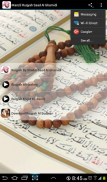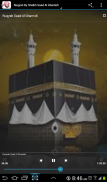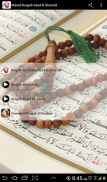





Ruqya MP3 By Saad Al Ghamidi

Descrizione di Ruqya MP3 By Saad Al Ghamidi
Ruqya refers to the recitation of some specific verses from the Holy Qur’an or to make supplication using words that are mentioned in the Hadith of Prophet Mohammad (saw). Ruqya can be described as a spiritual healing prayer in which verses from the Holy Qur’an or the supplications from the Prophet are used in order to heal oneself or somebody else from sickness and evil eye.
Ruqya is a Sunnah of our beloved Prophet Mohammad (saw). He used to recite ruqyah for himself whereas some of his companions (Sahaaba) used to recite ruqyah for themselves. We know for a fact that the Holy Quran has been sent down on earth as a guide and cure to all human beings. Allah (swt) has said in the Quran that Allah (swt) says in the Quran, ‘We send down (stage by stage) in the Quran that which is a healing and mercy to those who believe’.
Allah (swt) says in the Quran ‘If a suggestion from Satan assails thy (mind), seek refuge with God; for He heareth and knoweth (All things), and ''And when I am ill, it is He who cures me’. Allah (swt) also says in the Quran, ‘We send down from the Quran that which is a healing and mercy for those who believe”.
These verses from the Quran ascertain that Allah (swt) has told his followers to use the words from his Quran to cure us of all evils and illnesses. This treatment is known as ruqyah.
There is ample evidence from the ahadith that prove the significance of ruqya in Islam.
Sahih Bukhari Hadith (Volume 7, Number 634) narrated Aisha (RA) Prophet Mohammad (saw) ordered me or somebody else to do Ruqya in case there was a danger from an evil eye.
Sahih Bukhari Hadith (Volume 7, Number 631) Narrated 'Aisha (RA): During the Prophet's (saw) serious illness, he used to recite the Mu'auwidhat (Surat An-Nas and Surat Al-Falaq) and then blow his breath over his body. When his pain became intense, I used to recite those two Suras and blow my breath over him and make him rub his body with his own hand for its blessings." (Ma'mar asked Az-Zuhri: How did the Prophet (prayers and peace be upon him) use to blow? Az-Zuhri said: He used to blow on his hands and then passed them over his face.) Hazrat Ayesha (ra) also said that, ‘Prophet Mohammad (saw) instructed me and everybody else to do Ruqya in case of danger from evil eye’
The significance of Surah Fatiha in ruqyah healing:
Besides being called Al-Hamd, As-Salah, Ash-Shifa and Umm al-kitab Surah Fatiha is also called Ar-Ruqyah (remedy), because there is the narration in the Sahih of Abu Sa`id telling the story of a Sababa/ Companion of the Prophet (saw) who used Al-Fatihah as a cure for the tribal chief who was stung by a scorpion. Later on, Prophet Mohammad (saw) said to a Companion,
"How did you know that Surah Fatiha is a Ruqyah?"
Some commentators opined that the focal point of healing powers of Surah Fatiha is in the power and blessings of the words: “Thee we worship(iyyaka na`budu), and Thy help we seek (iyyaka nasta`in)” The words, worship(na’budu) and help (nasta`in) have been understood to be the strongest elements for the most effective cure. In these lines we directly plead for help from the Allah (swt) (al-Shafi) whom we completely trust for recovery. This is why surah al-fatihah is one of recommended surah to be recited for ruqyah.
In Bab Fadl Fatihat al-Kitab of Kitab Fada`il al-Quran, Imam Bukhari reported that: Narrated Abu Sa'id Al-Mu'alla, ‘Once when I was praying the Prophet (saw) called me but I did not respond to his call. Later on I said, "O Allah's Apostle! I was praying." He said, "Didn't Allah say: 'O you who believe! Give your response to Allah (by obeying Him) and to His Apostle when he calls you'?" (8.24). He then said, "Shall I not teach you the most superior Surah in the Qur'an?" He said, '(It is), 'Praise be to Allah, the Lord of the worlds. '(i.e., Surat Al-Fatiha) which consists of seven repeatedly recited Verses and the Magnificent Qur'an which was given to me.
Ruqya si riferisce alla recita di alcuni versetti specifici dal Sacro Corano o per fare supplica usare parole che sono menzionati nella Hadith del Profeta Maometto (saw). Ruqya può essere descritto come una preghiera di guarigione spirituale in cui versetti del Sacro Corano o le suppliche del Profeta sono utilizzati al fine di guarire se stessi o qualcun altro da malattie e malocchio.
Ruqya è una Sunnah del nostro amato profeta Maometto (saw). Aveva l'abitudine di recitare ruqyah per sé, mentre alcuni dei suoi compagni (Sahaaba) usata per recitare ruqyah per se stessi. Sappiamo per certo che il Santo Corano è stato fatto scendere sulla terra come una guida e la cura di tutti gli esseri umani. Allah (SWT) ha detto nel Corano che Allah (SWT) dice nel Corano, 'Abbiamo fatto scendere (fase per fase) nel Corano ciò che è guarigione e misericordia per coloro che credono'.
Allah (SWT) dice nel Corano: 'Se un suggerimento da Satana assale tua (la mente), rifugio in Dio; Egli ascolta e conosce (tutte le cose), e '' E quando sono malato, è Lui che mi guarisce '. Allah (SWT) dice anche nel Corano, 'facciamo scendere dal Corano ciò che è guarigione e misericordia per coloro che credono ".
Questi versetti del Corano accertare che Allah (SWT) ha detto ai suoi seguaci a usare le parole del suo Corano a curarci di tutti i mali e le malattie. Questo trattamento è noto come ruqyah.
È ampiamente dimostrato dalla ahadith che dimostrano l'importanza di Ruqya nell'Islam.
Sahih Bukhari Hadith (Volume 7, Numero 634) narrato Aisha (RA) Profeta Muhammad (saw) io o qualcun altro a fare Ruqya nel caso ci fosse un pericolo da un occhio maligno ordinato.
Sahih Bukhari Hadith (Volume 7, Numero 631) Narrato 'Aisha (RA): Durante la malattia grave (sega) del Profeta, aveva l'abitudine di recitare il Mu'auwidhat (Surat An-Nas e Surat Al-Falaq) e poi soffiare il respiro sul suo corpo. . Quando il suo dolore divenne intenso, ho usato a recitare questi due sure e di colpo il mio respiro su di lui e fargli strofinare il suo corpo di suo pugno per le sue benedizioni "(Ma'mar chiesto Az-Zuhri: come ha fatto il Profeta (preghiere e ? la pace sia su di lui) usa per soffiare Az-Zuhri ha detto: Ha usato per soffiare sulle mani e poi li passò sul viso) Hazrat Aisha (ra) ha anche detto che, 'Profeta Maometto (saw) io e tutti gli altri istruito. a fare Ruqya in caso di pericolo dal male occhio '
Il significato della sura Fatiha in ruqyah guarigione:
Oltre ad essere chiamato Al-Hamd, As-Salah, Ash-Shifa e Umm al-Kitab sura Fatiha è anche chiamato Ar-ruqyah (rimedio), perché non vi è la narrazione nel Sahih di Abu Sa'id raccontare la storia di un Sababa / compagno del Profeta (saw) che ha usato Al-Fatiha come una cura per il capo tribù che è stato punto da uno scorpione. Più tardi, Profeta Muhammad (saw) ha detto a un compagno,
"Come hai fatto a sapere che Sura Fatiha è un ruqyah?"
Alcuni commentatori opinato che il punto focale di poteri di guarigione di Sura Fatiha è in potere e le benedizioni delle parole: "Te noi adoriamo (iyyaka na`budu), e il Tuo aiuto che cercano (iyyaka nasta`in)" Le parole, culto (na'budu) e l'aiuto (nasta`in) sono stati capito di essere gli elementi più forti per la cura più efficace. In queste righe imploriamo direttamente aiuto al di Allah (SWT) (al-Shafi) cui ci fidiamo completamente per il recupero. Questo è il motivo Sura al-Fatiha è una delle sura raccomandato da recitarsi per ruqyah.
A Bab al-Fadl Fatihat Kitab di Kitab al-Quran Fada`il, Imam Bukhari ha riportato che: Narrato Abu Sa'id Al-Mu'alla, 'Una volta, quando stavo pregando il Profeta (saw) mi ha chiamato, ma non ho risposto alla sua chiamata. Più tardi ho detto: "O Allah Apostolo! Stavo pregando." Egli disse: "Non ha detto Allah: 'O voi che credete, dare la vostra risposta ad Allah (obbedendo a Lui), e per Suo Messaggero quando vi chiama'" (8.24). Egli ha poi detto: "Non dovrei insegnare la sura più superiore nel Corano?" Ha detto: '(E'), 'Lode ad Allah, Signore dei mondi. '(vale a dire, Surat Al-Fatiha), che si compone di sette volte recitato versi e il Magnifico Corano che mi è stata data.


























